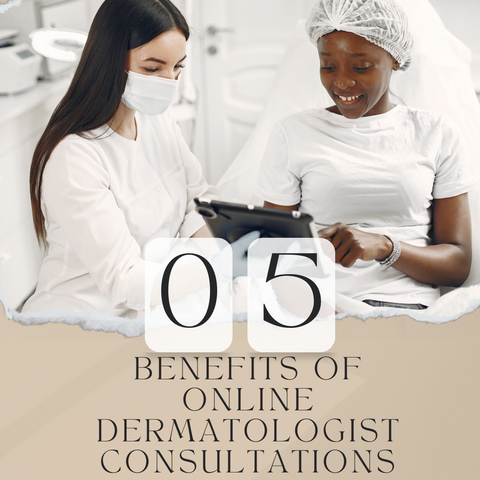While skincare trends keep evolving, so do the habits of skincare users. 2026 is seeing the popularity of online dermatologist consultations rise by almost 15% year-over-year. This means that you can now consult the best dermatologists in India online and from anywhere! Several variables will contribute to the change to online dermatological consultations in India in 2026, which we will investigate in this blog.
Latest online dermatology trends in 2026

-
The skincare market in India was estimated to be above INR 12,000 crores in the year 2020 and is expected to keep growing.
-
Expert or dermatologist care for skin and hair is still not accessible in a number of Tier 2 and Tier 3 cities.
-
Consumers are much more likely to believe in science-backed skincare products or haircare products in 2026.
-
Ingredient-based skincare is becoming more and more crucial to adopting a healthy skincare routine.
-
Hair care is becoming just as important as skincare routine, with a focus on conditions such as Alopecia and COVID-related hair loss.
5 benefits of online dermatologist consultations

Since hair and skincare consumers are becoming increasingly aware, skincare trends are shifting towards methods that are both easy and effective. Therefore, people are turning to online or telemedicine platforms to access science-backed skincare or haircare.
The following are the top five advantages of consulting dermatologists online:
-
Accessibility: People can obtain specialised care more easily with the help of online dermatology consultations, particularly those who live in rural or underserved areas. Patients can communicate with dermatologists from the convenience of their own homes, removing geographical barriers and reducing the need for travel.
-
Convenience: Patients can schedule appointments at their preferred times and locations with online consultations. This can save patients the trouble of driving to a physical clinic, waiting in long lines, and missing work.
-
Time Efficiency: Online consultations typically have shorter wait times than in-person visits. Dermatologists can provide patients with prompt attention, making it easier to seek treatment or advice when necessary.
-
Privacy and Comfort: Many patients prefer online consultations to in-person visits because they are less intimidating and more private. They can talk about sensitive skin issues in the privacy and comfort of their own home, which may encourage open and honest communication.
-
Follow-up and Continuity of Care: Online consultations allow patients to maintain ongoing communication with dermatologists, ensuring that they receive appropriate follow-up care, monitor their progress, and ask questions as needed. This continuity of care can be especially beneficial in the treatment of chronic skin conditions.
It is important to note that online dermatology consultations are not appropriate for all cases, as some conditions may necessitate in-person examinations or tests. Patients should consult with dermatologists or other healthcare providers to determine the best course of treatment for their specific needs.
#1 Ease of access - consult from anywhere!

When you consult dermatologists online, you can do so even from the comfort of your home. Imagine sitting at home or on the couch and getting the dermatologist consultation you had planned for so long!
Since consumers are getting more and more busy, they have less time to book appointments and consult dermatologists the conventional way. It’s much easier to schedule and hop on a video call on a digital health platform from the office, home, etc., and get the expert advice that your skin or hair needs.
There are various advantages to this accessibility:
-
Geographic Flexibility: Patients can easily connect with specialists no matter where they are, even in remote or rural areas where access to dermatologists may be limited.
-
Reduced Travel Time and Costs: Online consultations eliminate the need for patients to travel long distances to a physical clinic. This not only saves time but also money on transportation.
-
Convenience: Patients can schedule appointments at times that are most convenient for them, such as during their lunch break at work, at night, or on weekends.
-
Emergency Consultations: In an emergency, patients can quickly contact dermatologists for immediate advice without having to wait for an in-person appointment.
-
International Expertise: Online consultations give patients access to dermatologists and specialists from all over the world, allowing them to seek the advice of renowned professionals even if they are in another country.
-
Follow-up Care: Without the need for frequent clinic visits, patients can easily maintain regular follow-up appointments and monitor their progress.
-
Comfort and Privacy: Since patients can consult in the comfort of their own homes, more privacy can be maintained and delicate skin issues can be discussed more easily.
While online dermatology consultations have these benefits, it is vital to remember that they might not be appropriate in every situation. Certain conditions necessitate in-person assessments, diagnostic exams, or other treatments that are not possible to complete online. Patients should collaborate with medical professionals to identify the best course of action for their unique needs.
#2 Fast and hassle-free consultation

Since consumers are getting more and more busy, they have less time to book appointments and consult dermatologists the conventional way. It’s much easier to schedule and hop on a video call on a digital health platform from the office, home, etc., and get the expert advice that your skin or hair needs.
Clinikally allows you to connect with some of the best dermatologists in India in under 30 minutes. Just fill out a quick and easy form about your skin or hair concerns, and you will be connected to the right dermatologist suitable for giving advice or treatment.
Online dermatologist consultations also provide quick and easy access to dermatologists. Reduced wait times, effective scheduling, time savings, flexible scheduling, 24/7 accessibility, streamlined record keeping, and follow-up appointments are some of the ways these benefits can help patients. Because of these advantages, online dermatologist consultations are a convenient and efficient solution for many patients, minimising the time and effort required to receive expert dermatological care. However, certain skin disorders may still necessitate physical examinations, biopsies, or other testing that cannot be performed online. Patients should work with healthcare providers to establish the best method for their individual requirements.
#3 Consult the best dermatologists online

Most Tier 2 or Tier 3 cities still don’t have proper access to dermatology clinics or hospitals. Due to a lack of experienced doctors in your area, you might not be getting the right or expert-level care for your skin or hair condition.
In a number of cases such as eczema, acne, or even common skin conditions such as dry skin, the underlying cause remains untreated. Only a qualified and expert dermatologist can provide the best and most reliable advice for what will work and what will not. When you consult dermatologists or skin specialists online, you can get consultations from some of the best dermatologists in India,depa even if you are in another city. Thus, visiting a telemedicine or digital health platform can allow you quick and easy access to the most experienced dermatologists remotely.
You can consult the best dermatologists online by taking the following steps:
-
Start by looking for reputable online dermatology platforms or websites that offer virtual consultations with certified dermatologists. Look for platforms with a good reputation and a lot of positive feedback.
-
Check to see if the dermatologists on the platform are licenced medical professionals with the necessary qualifications and certifications.
-
Look for patient evaluations and testimonials to evaluate the quality of care provided by the dermatologists on the platform. Patients can provide feedback in a variety of venues.
-
Make certain that the platform you select values privacy and security. Look for features such as encrypted communication and secure data storage.
-
Once a dermatologist and platform have been chosen, make an appointment at a time that is convenient for you. You can select your favorite dermatologist on a number of platforms according to their availability.
-
Gather any pertinent medical history, photos of your skin condition, and a list of questions or concerns you would like to address during the consultation before your appointment.
-
Log in to the platform at the appointed time for your consultation. Prepare to explain your symptoms and respond to any questions the dermatologist may have.
-
The dermatologist will provide suggestions following the appointment, which may include treatment choices, prescriptions, or lifestyle changes. Take their advice and treatment plan seriously.
-
Make sure to arrange any additional care or follow-up appointments that your dermatologist recommends for your condition.
-
After your consultation, you can leave feedback on the platform to assist others seeking dermatological care.
While online dermatology consultations can be extremely beneficial, they may not be appropriate for all medical situations. Some conditions may necessitate in-person examinations, diagnostic tests, or procedures that are not possible to perform online. To determine the best approach for your specific needs, consult with a healthcare professional.
#4 Back your skincare routine with science

Skincare routine is a delicate job, and following all the steps correctly can improve your skin tone, skin health, and hair health drastically!
By consulting skin specialists online, you can get expert help on what to use and what to avoid for your skin. Consulting top dermatologists online can help you avoid some mistakes and progress towards healthier skin faster in a fast and easy way.
Adding science to your skincare routine entails choosing products and practises that are validated by scientific research and have established efficacy. Sunscreen, cleansing, retinoids, antioxidants, hydration, prescription treatments, patch testing, personalisation, preventing over-exfoliation, lifestyle factors, patience, and consultation with a dermatologist are some science-backed aspects to consider when developing an evidence-based skincare routine. You can establish an evidence-based and individualised skincare routine by following these science-backed principles and checking with a dermatologist when needed.
#5 Building trust in your online dermatologist

Whether consulting online or offline, you never know how right your doctor is. You can avoid this dilemma by opting for a trusted online health platform in India that offers reliable and effective treatments as a one-stop solution for skincare or haircare.
You will feel more comfortable trusting your dermatologist when you know the platform is already providing skincare and haircare products to thousands of users every day. Moreover, you will be able to get the best skincare products for complicated skin or hair concerns such as acne, dry or irritated skin, eczema, and hyperpigmentation all under one roof - after the right product is prescribed by your dermatologist.
Here are some steps you can take to build trust in your online dermatologist:
-
Select Reputable Platforms: Begin by choosing a reputable online dermatology platform or website that connects you with certified dermatologists. Read reviews and look for certifications to ensure the platform's credibility.
-
Check the Dermatologist's Credentials: Before your consultation, check the dermatologist's credentials and qualifications. Check that they are a licenced medical professional who specialises in dermatology.
-
Read Patient Reviews and Testimonials: Look for patient reviews and testimonials to learn about other people's experiences with the dermatologist. Positive feedback and reviews can be an indication of trustworthiness.
-
Examine the Privacy and Security Policies of the Platform: Make certain that the online platform values privacy and security. To protect your personal information, look for features such as encrypted communication and secure data storage.
-
Communication and Transparency: Reputable dermatologists will communicate with you in an open and transparent manner. They will answer your questions, explain their recommendations, and lay out a detailed treatment plan for you.
-
Honesty and Realistic Expectations: A trustworthy dermatologist will set realistic expectations rather than promising miraculous results. They will talk about the limitations of treatments as well as the potential risks.
-
Maintain Professional Ethics: Make certain that the dermatologist follows professional ethics and guidelines for online consultations. They should respect your privacy, keep your information private, and make evidence-based recommendations.
-
Seek a Second Opinion: If you have any doubts or are unsure about a diagnosis or treatment plan, do not be afraid to seek the advice of another dermatologist or healthcare professional.
-
Personal Comfort: Trust in your healthcare provider is frequently a matter of personal comfort. If you are not comfortable with your dermatologist, you should consider seeking care elsewhere.
-
Examine Online Ratings: A variety of online platforms enable patients to rate their interactions with healthcare providers. Examine these ratings and reviews to determine the dermatologist's dependability.
-
Examine Follow-Up Care: Determine how the dermatologist handles follow-up care and whether they respond to your concerns and questions.
-
Consult a Dermatologist in Person: Before proceeding with online consultations, it may be beneficial to schedule an in-person consultation with a dermatologist to establish trust.
By following these steps and being diligent in your research, you can gain trust in your online dermatologist and have confidence in the care and advice they provide. Trust is an essential component of a successful patient-provider relationship, whether in person or online.
How to find the best dermatologists online in India

In order to find the best skin or hair specialist online, it is recommended to follow these steps:
-
Find a platform: There are a number of science-backed healthcare platforms, but a hair or skincare platform that focuses especially on dermatology is more likely to offer online consultations with the best dermatologists.
-
Check for doctor availability: You should be able to find some of the best dermatologists in Delhi, Mumbai, Bangalore, etc. regardless of the city you are consulting from.
-
Check for proof from fellow users: Make sure to read the testimonials and customer reviews as it gives a crucial impression of the response from other people similar to you.
-
Connect and consult! Fill in the right information - the more details you provide, the better advice you will be able to get targeted for your concern.
Always keep in mind that having a positive patient-provider relationship requires you to trust your dermatologist, whether you consult with them in person or virtually. By taking these actions and doing your research, you can find a reputable dermatologist in India that practises online and meets your needs while providing excellent care.
Power up your skin hair care game with science

Skincare and haircare are vital aspects of self-care, and dermatologists recommend not ignoring them due to the long-term impacts of negligence. Whether you are buying skincare products online or wish to get an online consultation, expert advice from a dermatologist can make the difference.
You can consult the best dermatologists in India on Clinikally, and get expert advice for skin or hair, or even personalised treatment plans designed to treat your condition as per your specific skin type. The following scientifically supported advice can help you improve your skin and hair care routine:
For Skin:
-
Cleaning: To keep your skin's natural barrier intact, use a gentle, pH-balanced cleanser. Over-cleansing or using harsh products can upset your skin's balance.
-
Sunscreen: One of the most effective ways to prevent premature ageing, lower the risk of skin cancer, and maintain healthy skin is to use sunscreen. For daily use, use a broad-spectrum sunscreen with an SPF of 30 or higher.
-
Antioxidants: Serums and creams high in antioxidants, such as vitamin C, can help protect your skin from free radicals and environmental damage.
-
Retinoids: Retinoids, such as retinol, have been shown in studies to diminish fine lines, increase the production of collagen, and enhance the texture of the skin. They can also aid in the treatment of acne.
-
Moisturise: Keeping your skin hydrated helps to maintain the skin barrier and reduces the risk of irritation and dryness.
-
Exfoliation: Exfoliation can be used to remove dead skin cells and improve the texture of the skin. For best results, use chemical exfoliants containing alpha hydroxy acids (AHAs) or beta hydroxy acids (BHAs).
-
Hydration: Incorporate hyaluronic acid into your skincare routine to help your skin retain moisture and plump up.
For Hair:
-
Scalp Health: Healthy hair begins with a healthy scalp. To keep your scalp healthy, use a gentle, pH-balanced shampoo and conditioner.
-
Protein: Keratin, a type of protein, makes up the majority of hair. Make sure your diet contains enough protein, and think about using protein-rich hair products.
-
Vitamins and minerals: Nutrients such as biotin, vitamins (particularly B vitamins), iron, and zinc are essential for hair health. Make sure your diet is high in these nutrients, or consider taking supplements if a doctor recommends it.
-
Avoid Heat and Chemical Damage: Keep heat styling and chemical treatments to a minimum because they can weaken the hair shaft and cause damage.
-
Trim on a regular basis: Trimming on a regular basis can help maintain hair health by preventing split ends from traveling up the hair shaft.
-
Sun protection: UV rays can cause hair damage. When in direct sunlight, use UV-protective hair products or cover your hair with a hat.
-
Stress Reduction: Chronic stress can lead to hair loss. Maintain overall health and hair health by using stress-reduction techniques.
-
Consult a Dermatologist: If you have specific hair concerns or significant hair loss, see a dermatologist. They can offer personalised advice and, if necessary, recommend treatments.
Consistency and patience are the keys to successful skincare and haircare routines. It may take some time to see visible results, but a science-backed approach will give you the best chance of long-term success.
Overcoming challenges of online consultations

Online consultations, while convenient and accessible, provide their own set of challenges for both patients and healthcare practitioners. Limited physical examination, technological barriers, privacy and security concerns, lack of in-person interaction, digital literacy, misdiagnosis, follow-up and monitoring, emergency situations, regulatory and licencing challenges, and patient education are some common issues and solutions in the context of online healthcare consultations. It is critical to speak honestly, address issues, and adapt to the unique features of online consultations while acknowledging their limitations.
Addressing the skepticism of online consultations

It's fair to be sceptical of online consultations, especially when people are used to receiving therapy in person. Addressing these challenges and educating patients about the benefits and dependability of online consultations may help build telehealth trust. Quality assurance, safety and security, clear communication, professionalism and expertise, patient education, evidence-based practise, emergency situations, convenience and accessibility, patient testimonials, regulatory compliance, continuous improvement, cost savings, follow-up and monitoring, telehealth success stories, provider-patient relationships, and telehealth guidelines are some approaches to dealing with scepticism. Building confidence in telehealth requires open, transparent communication between healthcare providers and patients.
Ensuring quality in virtual dermatology appointments

It is important to ensure quality in virtual dermatology appointments to give patients effective and dependable therapy. Here are some steps to take and recommended practises to follow to maintain high-quality virtual dermatological consultations:
-
Choose Reputable Platforms: Select a reputable online dermatology platform that thoroughly screens and verifies dermatologist qualifications.
-
Check Licencing and Credentials: Ensure that the dermatologist is licenced to practise in your jurisdiction and has the necessary dermatology certifications.
-
Privacy and Security: Confirm that the platform and dermatologist follow strict privacy and security standards, such as secure communication and data protection.
-
Informed Consent: After learning about the possible advantages and drawbacks of the virtual consultation, patients should give their informed consent.
-
Get Ready Ahead of Time: Patients should get ready by recording their medical history, taking crisp pictures of the affected areas, and mentioning any particular worries.
-
Clear Communication: Dermatologists should explain the diagnosis, course of treatment, and possible results to patients in a language that is easy to understand.
-
Observe Evidence-Based Guidelines: When diagnosing and treating skin conditions, dermatologists ought to abide by evidence-based guidelines. They ought to stay current on the most recent findings.
-
Virtual Exam Techniques: Make use of virtual examination techniques, like examining images and posing targeted questions regarding symptoms. Teach patients how to perform self-examinations.
-
Diagnostic Tools: For an accurate diagnosis, make use of the proper diagnostic instruments and reference materials. Dermatologists ought to be competent decision-makers who can draw conclusions from the data at hand.
-
In-Person Referral: Be ready to suggest an in-person appointment when more thorough examinations, tests, or procedures that cannot be completed electronically call for it.
-
Cooperation: For a comprehensive approach to healthcare, work in tandem with specialists or primary care physicians as needed.
-
Patient Education: Patients should be informed about their condition, available treatments, and aftercare by dermatologists. Provide clear instructions and respond to any questions.
-
Telehealth Education: Dermatologists should be educated on best practises in telehealth, such as effective communication and virtual examination techniques.
-
Patient Input: Invite patients to share their opinions about the standard of care and their general virtual consultation experience.
-
Continuity of Care: Make certain that patients can readily contact you with any further questions or concerns and that they have access to follow-up appointments.
-
Documentation: Keep complete and correct records of the online consultation, including the diagnosis, course of treatment, and any drugs that were recommended.
-
Regular Continuing Education: Participate in continuing education and professional development to stay up to date on advances in dermatology and telehealth.
-
Regulatory Compliance: Adhere to regional, national, and international telehealth regulations as well as dermatology practise ethics.
-
Professionalism: Conduct virtual consultations with the same expertise and empathy that you would in-person consultations. Create trust and rapport with your patients.
-
Ethical Practice: Practise with integrity and ethical standards, putting the patient's best interests first.
Maintaining the greatest standards of care and patient safety in virtual dermatology consultations necessitates a commitment to maintaining the best standards of care and patient safety. Adherence to ethical and professional requirements, as well as open and effective communication between dermatologists and patients, is critical to providing high-quality care in the virtual world.
Safety and confidentiality in online consultations

To protect patients' personal health information and offer a secure and private experience, online healthcare consultations must be safe and confidential. Secure platforms, authentication, data encryption, firewall and antivirus, access control, patient consent, password protection, privacy policies, user training, endpoint security, multifactor authentication, secure file sharing, logout and session termination, remote monitoring, secure payment handling, emergency protocols, regular audits and updates, legal compliance, incident response Transparent communication with patients about data security and privacy policies is also essential for establishing trust in telehealth services.
































